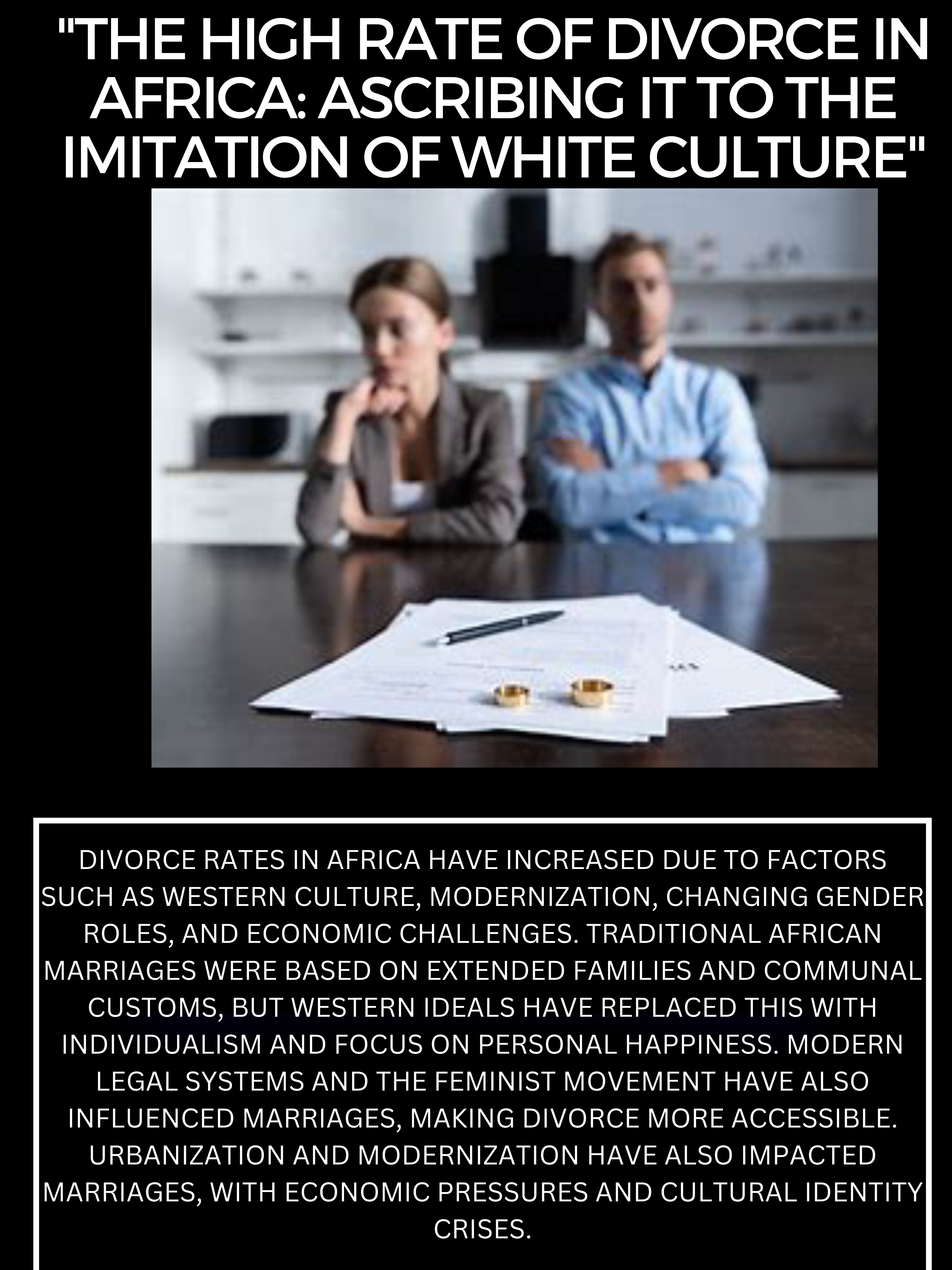
THE HIGH RATE OF DIVORCE IN AFRICA: ASCRIBING IT TO THE IMITATION OF WHITE CULTURE
Divorce, once considered a rarity and a social taboo in Africa, has seen a significant rise in recent decades. This trend has sparked intense debate about its causes, with one popular argument suggesting that the imitation of Western or "white" culture is a primary factor. While this assertion is not without merit, it is overly simplistic and fails to account for the multifaceted nature of the issue. This essay explores the connection between the rising divorce rates in Africa and the influence of Western culture, while also examining other contributing factors such as modernization, changing gender roles, and economic challenges.
The Role of Traditional African Marriages:
Historically, marriage in Africa was a deeply communal affair, governed by traditional customs and supported by extended families. Marriages were often arranged, with families playing a significant role in ensuring compatibility between spouses. Divorce was discouraged and, in many cases, stigmatized. When conflicts arose in marriage, the extended family served as mediators to help resolve issues.
However, the rise of Western culture has altered this dynamic. Individualism, a hallmark of Western ideology, contrasts sharply with the communal nature of African societies. As Africans adopt Western ideals, the traditional collective approach to marriage is increasingly being replaced by a focus on personal happiness and self-fulfillment. While this shift empowers individuals, it also weakens the societal structures that once safeguarded marriages.
The Influence of Western Ideals on Marriage:
One of the most significant ways Western culture has influenced marriage in Africa is through the media. Movies, television shows, and social media platforms portray romantic relationships that prioritize love, personal freedom, and individual satisfaction over familial or societal obligations. As a result, many Africans are beginning to view marriage through a lens shaped by Western romantic ideals rather than traditional expectations.
Western legal systems, which have been adopted in many African countries, also play a role. Unlike traditional African customary laws that often make divorce complex and time-consuming, modern legal frameworks have simplified the process. This accessibility has made divorce a more viable option for couples experiencing marital difficulties.
Furthermore, the feminist movement, which originated in the West, has inspired a shift in gender dynamics across Africa. Women are increasingly asserting their rights and refusing to remain in marriages where they experience abuse, neglect, or dissatisfaction. While this empowerment is a positive development, it has also contributed to rising divorce rates as more women seek independence.
Urbanization and Modernization
Urbanization and modernization, often associated with Western influence, have also impacted African marriages. As more people migrate to urban areas, they leave behind the communal support systems that traditionally helped sustain marriages. Urban living often brings economic pressures, long work hours, and exposure to new lifestyles, which can strain relationships.
Additionally, modernization has changed societal expectations. In the past, the primary purpose of marriage in many African societies was procreation and the continuation of family lineage. Today, couples are increasingly looking for emotional and intellectual compatibility, which can lead to unmet expectations and, ultimately, divorce.
Economic Pressures
While Western culture is often blamed for rising divorce rates, economic challenges also play a significant role. Unemployment, financial instability, and poverty place immense stress on marriages. In many cases, the inability to meet financial obligations leads to conflicts and resentment between spouses.
Interestingly, some argue that the imitation of Western culture exacerbates these economic pressures. For instance, the adoption of Western wedding traditions, which often involve extravagant ceremonies and expensive gifts, places a financial burden on couples from the outset of their marriage.
Cultural Identity Crisis
The rising divorce rates in Africa can also be viewed as a symptom of a broader cultural identity crisis. As African societies grapple with the tension between preserving traditional values and embracing modernity, individuals often find themselves caught in the middle. This conflict is particularly evident in marriage, where traditional expectations clash with modern ideals.
For example, in traditional African culture, marriage is often viewed as a lifelong commitment, regardless of personal happiness. In contrast, Western culture emphasizes individual fulfillment, leading to the belief that it is acceptable to leave a marriage if one is unhappy. This shift in mindset has contributed to the normalization of divorce.
In Conclusion,While it is convenient to attribute the high rate of divorce in Africa solely to the imitation of white culture, this perspective oversimplifies a complex issue. The rising divorce rates are the result of multiple interrelated factors, including modernization, economic pressures, changing gender roles, and the influence of Western media and legal systems.
Rather than blaming Western culture, it is essential for African societies to critically evaluate these influences and find a balance between preserving traditional values and embracing beneficial aspects of modernity. By fostering open communication, strengthening support systems, and promoting mutual respect in marriages, Africa can address the underlying causes of divorce while preserving the sanctity of this vital institution.



0 COMMENTS